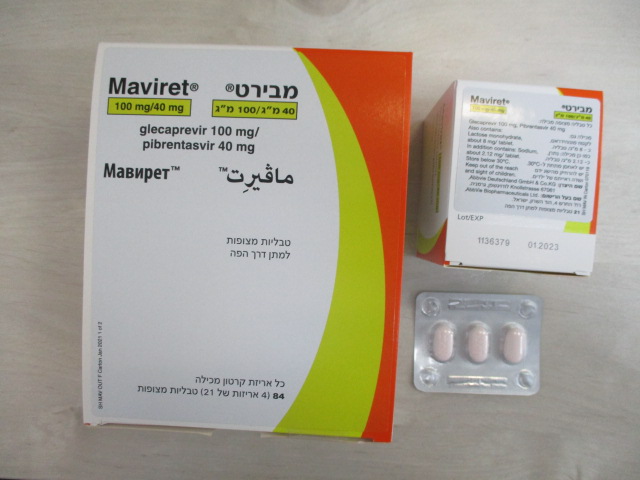Quest for the right Drug

מבירט MAVIRET (GLECAPREVIR, PIBRENTASVIR)
תרופה במרשם
תרופה בסל
נרקוטיקה
ציטוטוקסיקה
צורת מתן:
פומי : PER OS
צורת מינון:
טבליות מצופות פילם : FILM COATED TABLETS
עלון לרופא
מינוניםPosology התוויות
Indications תופעות לוואי
Adverse reactions התוויות נגד
Contraindications אינטראקציות
Interactions מינון יתר
Overdose הריון/הנקה
Pregnancy & Lactation אוכלוסיות מיוחדות
Special populations תכונות פרמקולוגיות
Pharmacological properties מידע רוקחי
Pharmaceutical particulars אזהרת שימוש
Special Warning עלון לרופא
Physicians Leaflet
Special Warning : אזהרת שימוש
4.4. Special warnings and precautions for use Hepatitis B virus reactivation Cases of hepatitis B virus (HBV) reactivation, some of them fatal, have been reported during or after treatment with direct acting antiviral agents. HBV screening should be performed in all patients before initiation of treatment. HBV/HCV co-infected patients are at risk of HBV reactivation, and should, therefore, be monitored and managed according to current clinical guidelines. Hepatic impairment Postmarketing cases of hepatic decompensation/failure, including those with fatal outcomes, have been reported in patients treated with HCV NS3/4A protease inhibitor-containing regimens, including Maviret. Because these events are reported voluntarily from a population of uncertain size, it is not always possible to reliably estimate their frequency or establish a causal relationship to drug exposure. The majority of patients with severe outcomes had evidence of advanced liver disease with moderate or severe hepatic impairment (Child-Pugh B or C) prior to initiating therapy with Maviret, including some patients reported as having compensated cirrhosis with mild liver impairment (Child-Pugh A) at baseline but with a prior decompensation event (i.e., prior history of ascites, variceal bleeding, encephalopathy). Rare cases of hepatic decompensation/failure were reported in patients without cirrhosis or with compensated cirrhosis (Child-Pugh A); many of these patients had evidence of portal hypertension. Events also occurred in patients taking a concomitant medication not recommended for coadministration, or in patients with confounding factors such as serious liver related medical or surgical comorbidities. Cases typically occurred within the first 4 weeks of treatment (median of 27 days). In patients with compensated cirrhosis (Child Pugh A) or evidence of advanced liver disease such as portal hypertension, perform hepatic laboratory testing as clinically indicated; and monitor for signs and symptoms of hepatic decompensation such as the presence of jaundice, ascites, hepatic encephalopathy, and variceal hemorrhage. Discontinue Maviret in patients who develop evidence of hepatic decompensation/failure. Maviret is contraindicated in patients with moderate to severe hepatic impairment (Child-Pugh B or C) or those with any history of prior hepatic decompensation. (see sections 4.2, 4.3, and 5.2). Patients who failed a prior regimen containing an NS5A- and/or an NS3/4A-inhibitor MAV API Feb 24_CL Page 3 of 25 Genotype 1-infected (and a very limited number of genotype 4-infected) patients with prior failure on regimens that may confer resistance to glecaprevir/pibrentasvir were studied in studies MAGELLAN- 1 and B16-439 (section 5.1). The risk of failure was, as expected, highest for those exposed to both classes. A resistance algorithm predictive of the risk for failure by baseline resistance has not been established. Accumulating double class resistance was a general finding for patients who failed re- treatment with glecaprevir/pibrentasvir in MAGELLAN-1. No re-treatment data is available for patients infected with genotypes 2, 3, 5 or 6. Maviret is not recommended for the re-treatment of patients with prior exposure to NS3/4A- and/or NS5A inhibitors. Drug-drug interactions Co-administration is not recommended with several medicinal products as detailed in section 4.5. Use in diabetic patients Diabetics may experience improved glucose control, potentially resulting in symptomatic hypoglycaemia, after initiating HCV direct acting antiviral treatment. Glucose levels of diabetic patients initiating direct acting antiviral therapy should be closely monitored, particularly within the first 3 months, and their diabetic medicines modified when necessary. The physician in charge of the diabetic care of the patient should be informed when direct acting antiviral therapy is initiated. Lactose Maviret contains lactose. Patients with rare hereditary problems of galactose intolerance, total lactase deficiency or glucose-galactose malabsorption should not take this medicinal product. Sodium This medicinal product contains less than 1 mmol sodium (23 mg) per tablet, that is to say essentially ‘sodium-free’.
Effects on Driving

פרטי מסגרת הכללה בסל
א. התרופה תינתן לטיפול בהפטיטיס C כרונית גנוטיפ 1 או 2 או 3 או 4. ב. הטיפול בתרופה ייעשה על פי מרשם של רופא מומחה המטפל במחלות כבד.
שימוש לפי פנקס קופ''ח כללית 1994
לא צוין
תאריך הכללה מקורי בסל
11/01/2018
הגבלות
תרופה מוגבלת לרישום ע'י רופא מומחה או הגבלה אחרת
מידע נוסף
עלון מידע לצרכן
27.03.18 - עלון לצרכן 12.10.21 - עלון לצרכן 07.08.22 - עלון לצרכן אנגלית 07.08.22 - עלון לצרכן עברית 07.08.22 - עלון לצרכן ערבית 07.08.22 - עלון לצרכן 28.02.24 - עלון לצרכן עברית 01.05.24 - עלון לצרכן אנגלית 01.05.24 - עלון לצרכן עברית 01.05.24 - עלון לצרכן ערבית 01.05.24 - עלון לצרכן 28.02.19 - החמרה לעלון 18.06.19 - החמרה לעלון 06.08.19 - החמרה לעלון 22.01.20 - החמרה לעלון 26.03.20 - החמרה לעלון 26.04.20 - החמרה לעלון 03.08.20 - החמרה לעלון 09.06.21 - החמרה לעלון 21.06.21 - החמרה לעלון 31.05.22 - החמרה לעלון 07.08.22 - החמרה לעלוןלתרופה במאגר משרד הבריאות
מבירט